关于英语里宾语从句的用法
宾语从句的用法和语序

宾语从句的用法和语序引言:宾语从句是英语语法中的重要部分,它在句子中充当宾语的角色。
准确地运用宾语从句的用法和语序,有助于提高语言表达的准确性和流畅性。
本文将介绍宾语从句的常见用法和正确的语序。
一、宾语从句的基本概念宾语从句是指在一个句子中作主句的谓语动词的宾语,并具备完整的句子结构。
宾语从句通常引导词使用that, if, whether等,用于引导从句。
下面是宾语从句的几种基本用法:1. 表示事实或真理:常用的引导词是that。
例如:He believed that honesty is the best policy.(他相信诚实是最好的策略。
)2. 表示观点或意见:常用的引导词是that。
例如:I think that we should study harder for the final exam.(我认为我们应该更加努力地准备期末考试。
)3. 询问选择或疑问:常用的引导词是whether或if。
例如:I don't know whether/if he will come to the party.(我不知道他是否会来参加派对。
)4. 引述他人的话或心理活动:常用的引导词是that。
例如:She said that she was feeling tired.(她说她感觉很累。
)二、宾语从句的语序在宾语从句中,语序要根据语法规则进行调整,以使整个从句变成完整的句子。
下面是几种常见的语序要求:1. 陈述句语序:主语+谓语+宾语从句例如:He said that he was busy.(他说他很忙。
)2. 疑问句语序:特殊疑问词/疑问词+陈述句语序例如:Do you know where he lives?(你知道他住在哪里吗?)3. 祈使句语序:宾语从句语序与陈述句语序一致例如:He told me to study hard.(他告诉我要努力学习。
)4. 倒装语序:在某些引导词后要使用部分倒装语序例如:Not until did I realize that I had made a mistake.(直到那时我才意识到我犯了一个错误。
宾语从句知识点经典

宾语从句知识点经典
宾语从句是一个句子中作为宾语的从句。
它在语法上充当动词的宾语,充当的是名词的功能。
下面是关于宾语从句的一些知识点:
1.引导宾语从句的连词:
- 连词that:常用于陈述句中,通常可以省略。
- 连词if/whether:用于选择疑问句,表示“是否”,常用于不定式、动词不定式、形容词和副词后面。
- 连词连接代词:who, whom, whose, which, what等,引导人称代
词和疑问代词的宾语从句。
2.宾语从句的时态与语序:
-当主句是现在时,宾语从句中的时态随带动词的时态变化。
-动词的直接引语引导的宾语从句中,如果是陈述句时,则没有引号,不变时态。
-当宾语从句的主语是第三人称时,谓语动词用单数形式。
3.宾语从句的位置:
-宾语从句可以放在及物动词的后面,或者介词后面。
4.特殊的宾语从句:
-宾语从句可以是由动词不定式、动名词或从句充当动词的宾语。
-表示目的、愿望、怀疑、害怕、要求等意义的动词后面常跟不定式
宾语从句。
总的来说,宾语从句是句子中作为宾语的从句,它可以由that,
if/whether, 连接代词等引导,根据主句的时态变化,可以放在动词或介词的后面。
英语语法—从句—宾语从句用法
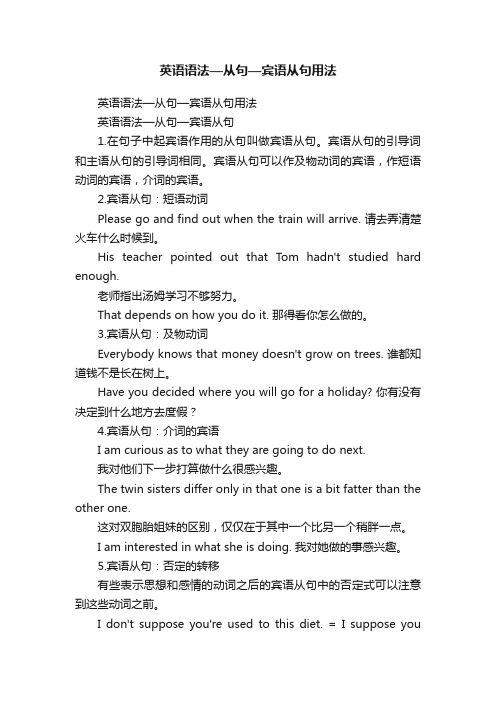
英语语法—从句—宾语从句用法英语语法—从句—宾语从句用法英语语法—从句—宾语从句1.在句子中起宾语作用的从句叫做宾语从句。
宾语从句的引导词和主语从句的引导词相同。
宾语从句可以作及物动词的宾语,作短语动词的宾语,介词的宾语。
2.宾语从句:短语动词Please go and find out when the train will arrive. 请去弄清楚火车什么时候到。
His teacher pointed out that Tom hadn't studied hard enough.老师指出汤姆学习不够努力。
That depends on how you do it. 那得看你怎么做的。
3.宾语从句:及物动词Everybody knows that money doesn't grow on trees. 谁都知道钱不是长在树上。
Have you decided where you will go for a holiday? 你有没有决定到什么地方去度假?4.宾语从句:介词的宾语I am curious as to what they are going to do next.我对他们下一步打算做什么很感兴趣。
The twin sisters differ only in that one is a bit fatter than the other one.这对双胞胎姐妹的区别,仅仅在于其中一个比另一个稍胖一点。
I am interested in what she is doing. 我对她做的事感兴趣。
5.宾语从句:否定的转移有些表示思想和感情的动词之后的宾语从句中的否定式可以注意到这些动词之前。
I don't suppose you're used to this diet. = I suppose youaren't used to this diet.我想你不习惯这种饮食。
宾语从句的用法归纳
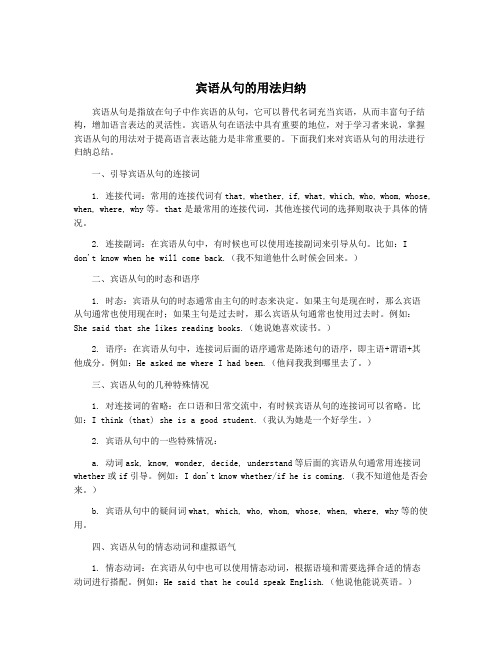
宾语从句的用法归纳宾语从句是指放在句子中作宾语的从句,它可以替代名词充当宾语,从而丰富句子结构,增加语言表达的灵活性。
宾语从句在语法中具有重要的地位,对于学习者来说,掌握宾语从句的用法对于提高语言表达能力是非常重要的。
下面我们来对宾语从句的用法进行归纳总结。
一、引导宾语从句的连接词1. 连接代词:常用的连接代词有that, whether, if, what, which, who, whom, whose, when, where, why等。
that是最常用的连接代词,其他连接代词的选择则取决于具体的情况。
2. 连接副词:在宾语从句中,有时候也可以使用连接副词来引导从句。
比如:Idon't know when he will come back.(我不知道他什么时候会回来。
)二、宾语从句的时态和语序1. 时态:宾语从句的时态通常由主句的时态来决定。
如果主句是现在时,那么宾语从句通常也使用现在时;如果主句是过去时,那么宾语从句通常也使用过去时。
例如:She said that she likes reading books.(她说她喜欢读书。
)2. 语序:在宾语从句中,连接词后面的语序通常是陈述句的语序,即主语+谓语+其他成分。
例如:He asked me where I had been.(他问我我到哪里去了。
)三、宾语从句的几种特殊情况1. 对连接词的省略:在口语和日常交流中,有时候宾语从句的连接词可以省略。
比如:I think (that) she is a good student.(我认为她是一个好学生。
)2. 宾语从句中的一些特殊情况:a. 动词ask, know, wonder, decide, understand等后面的宾语从句通常用连接词whether或if引导。
例如:I don't know whether/if he is coming.(我不知道他是否会来。
英语语法中宾语从句的用法详解

英语语法中宾语从句的用法详解宾语从句是英语学习中的常用语法,涉及到时态的转换,下面我们来详解一下宾语从句。
1、主句是一般现在时,从句根据实际情况使用任何时态。
例句:She says (that) she works from Monday to Friday.她说她从周一至周五上班。
(从句是一般现在时)She says (that) she will leave a message on his desk.她说她要在他桌子上留个便条。
(从句是一般将来时)2、主句是过去时态,从句须用过去时态的某种形式。
例句:He said there were no classes yesterday afternoon.他说昨天下午没有课。
(从句是一般过去时)He said (that) he was going to take care of the baby.他说他会去照看这个婴儿。
(从句是过去将来时)3、当宾语从句表示的是一个客观真理或者事实时,即使主句是过去时,从句也用一般现在时态。
例句:The teacher told us(that) nothing is difficult if we put our hearts into it.老师告诉我们世上无难事,只怕有心人。
She said(that) her father is twenty-eight years older thanher.她说她父亲比她大二十八岁。
He said that light travels much faster than sound.他说光比声音传播得快。
注意:当主句的谓语动词是think或believe,宾语从句要表达否定时,要把从句的否定转移到主句上。
I don't think he is going to help you with your English.我认为他不会帮你学英语的,这句话不可以翻译成:I think he isn't going to help you with your English.如果宾语从句有它的补语时,宾语从句用it代替,从句后置。
初中英语语法:宾语从句的用法
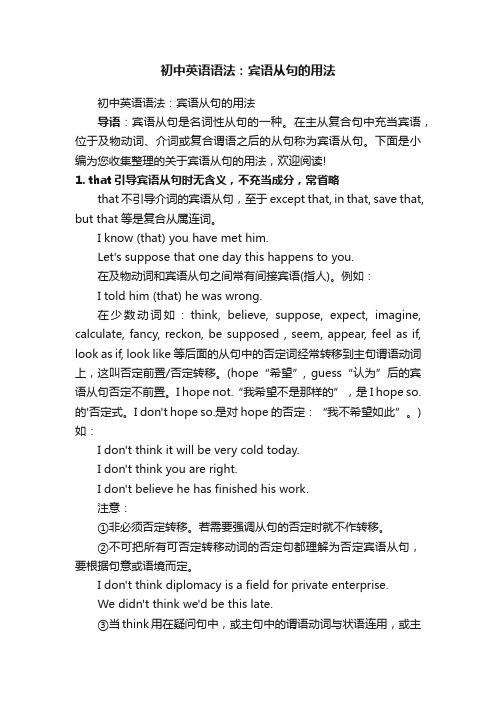
初中英语语法:宾语从句的用法初中英语语法:宾语从句的用法导语:宾语从句是名词性从句的一种。
在主从复合句中充当宾语,位于及物动词、介词或复合谓语之后的从句称为宾语从句。
下面是小编为您收集整理的关于宾语从句的用法,欢迎阅读!1. that引导宾语从句时无含义,不充当成分,常省略that不引导介词的宾语从句,至于except that, in that, save that, but that等是复合从属连词。
I know (that) you have met him.Let's suppose that one day this happens to you.在及物动词和宾语从句之间常有间接宾语(指人)。
例如:I told him (that) he was wrong.在少数动词如:think, believe, suppose, expect, imagine, calculate, fancy, reckon, be supposed , seem, appear, feel as if, look as if, look like等后面的从句中的否定词经常转移到主句谓语动词上,这叫否定前置/否定转移。
(hope“希望”, guess“认为”后的宾语从句否定不前置。
I hope not.“我希望不是那样的”,是I hope so.的'否定式。
I don't hope so.是对hope的否定:“我不希望如此”。
)如:I don't think it will be very cold today.I don't think you are right.I don't believe he has finished his work.注意:①非必须否定转移。
若需要强调从句的否定时就不作转移。
②不可把所有可否定转移动词的否定句都理解为否定宾语从句,要根据句意或语境而定。
英语宾语从句用法详解

英语宾语从句用法详解英语宾语从句是一个句子作为动词的宾语,一般由连词引导。
宾语从句可以出现在形容词、动词、名词的后面。
1. 形容词后面的宾语从句:形容词常用于某些短语动词后面,如believe, think, know, feel, understand, doubt等。
例如:- I believe that he is right.- She knows what she wants.- I doubt if they will come.- Do you understand what I'm saying?2. 动词后面的宾语从句:动词后面的宾语从句可以是及物动词或短语动词的宾语。
例如:- She said that she was tired.- He asked if I wanted anything to eat.- They want to know where we are going.- We saw that they were arguing.根据从句的内容和从句所在的动词,宾语从句可以有以下几种类型:- 陈述句型:that引导的从句,表示陈述或描述。
例如:She said that she would come.- 一般疑问句型:由疑问词引导的从句,以完整疑问句的形式出现。
例如:He asked me where I lived.- 特殊疑问句型:由疑问词引导的从句,以特殊疑问句的形式出现。
例如:Do you know what time it is?- 否定句型:由“whether...or not”或“if...not”引导的从句。
例如:I don't know whether he will come or not.3. 名词后面的宾语从句:名词后面的宾语从句通常由that引导,也可以使用其他连词引导,如whether, if, when, where等。
英语中宾语从句定语从句用法及例句总结(完整)
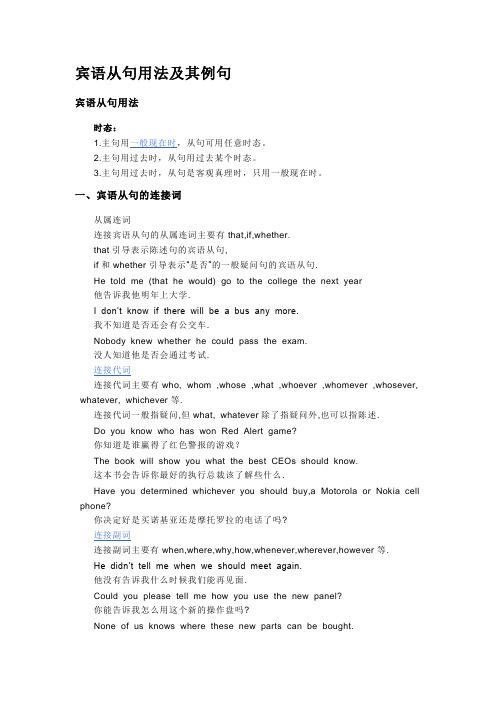
宾语从句用法及其例句宾语从句用法时态:1.主句用一般现在时,从句可用任意时态。
2.主句用过去时,从句用过去某个时态。
3.主句用过去时,从句是客观真理时,只用一般现在时。
一、宾语从句的连接词从属连词连接宾语从句的从属连词主要有that,if,whether.that引导表示陈述句的宾语从句,if和whether引导表示“是否”的一般疑问句的宾语从句.He told me (that he would) go to the college the next year他告诉我他明年上大学.I don’t know if there will be a bus any more.我不知道是否还会有公交车.Nobody knew whether he could pass the exam.没人知道他是否会通过考试.连接代词连接代词主要有who, whom ,whose ,what ,whoever ,whomever ,whosever, whatever, whichever等.连接代词一般指疑问,但what, whatever除了指疑问外,也可以指陈述.Do you know who has won Red Alert game?你知道是谁赢得了红色警报的游戏?The book will show you what the best CEOs should know.这本书会告诉你最好的执行总裁该了解些什么.Have you determined whichever you should buy,a Motorola or Nokia cell phone?你决定好是买诺基亚还是摩托罗拉的电话了吗?连接副词连接副词主要有when,where,why,how,whenever,wherever,however等.He didn’t tell me when we should meet again.他没有告诉我什么时候我们能再见面.Could you please tell me how you use the new panel?你能告诉我怎么用这个新的操作盘吗?None of us knows where these new parts can be bought.没有人知道这些的新的零件能在哪里买到.二、动词的宾语从句大多数动词都可以带宾语从句We all expect that they will win , for members of their team are strong er.我们都预料他们会赢,因为他们的队员更强壮.He told us that they would help us through the whole work.他告诉我们在整个工作中,他们都会帮忙的.部分“动词+副词”结构也可以带宾语从句I have found out that all the tickets for the concert have been sold out.我发现这场音乐会的所有票都卖光了.Can you work out how much we will spend during the trip?你能计算出这次旅行我们将花费多少钱吗?动词短语也可以带宾语从句常见的这些词有:make sure确保make up one’s mind下决心keep in mind牢记Make sure that there are no mistakes in your papers before you turn th em in.在上交试卷前确保没有任何错误.可运用形式宾语it代替的宾语从句①动词find,feel,consider,make,believe等后面有宾语补足语的时候,则需要用it 做形式宾语而将that宾语从句后置.I think it necessary that we take plenty of hot water every day .我认为每天多喝开水是有必要的.I feel it a pity that I haven’t been to the get-together.我没去聚会,感觉非常遗憾.I have made it a rule that I keep diaries.我每天写日记成了习惯.We all find it important that we (should) make a quick decision about t his mater.我们都认为对这件事马上做出决定很重要.②有些动词带宾语从句时需要在宾语与从句前加it这类动词主要有:hate, take , owe, have, see to.I hate it when they with their mouths full of food.我讨厌他们满嘴食物时说话.He will have it that our plan is really practical.他会认为我们的计划确实可行.We take it that you will agree with us.我们认为你会同意我们的.When you start the engine, you must see to it that car is in neutral.开启发动机时, 一定要使汽车的离合器处于空挡位置.③若宾语从句是wh-类,则不可用it代替We all consider what you said to be unbelievable.我们都认为你所说的是不可信的.We discovered what we had learned to be valuable.我们发现我们所学到的东西都是有用的.三、介词的宾语从句用wh-类的介词宾语从句We are talking about whether we admit students into our club.我们正在讨论是否让学生加入我们的俱乐部.The new book is about how Shenzhou 6 manned spaceship was sent u p into space.这本新书是关于神州6号载人航天飞船是如何升入太空的.用that,if引导的介词宾语从句有时候except,but,besides三个介词后可见到that引导的宾语从句I know nothing about my new neighbor except that he used to work wit h a company.对于我的新邻居我只知道他曾在一家公司上班,其他一无所知.四、形容词的宾语从句常用来引导宾语从句的形容词有: sure,certain,glad,please,happy,sorry,afraid,s atisfied,surprisedI am sure I will pass the exam.我确信我会通过考试.I am sorry that I have troubled you so long.很抱歉我这么长时间在打扰你.He is glad that Li Ming went to see him when he was ill.他很高兴在他生病的时候李明能去看望他.五、if,whether在宾语从句中的区别①if和whether在作“是否”解时,引导宾语从句常放在动词know,ask,care,wond er,find out等之后,介词后一般不用if②少数动词,如:leave,put,discuss,doubt后的宾语从句常用whether.③whether后可以加or not,但是if不可以.④在不定式前只能用whether.(如:I can’t decide whether to stay. 我不能决定是否留下。
初中英语知识点归纳宾语从句和宾语从句的用法区别

初中英语知识点归纳宾语从句和宾语从句的用法区别宾语从句和宾语从句都是英语语法中重要的知识点,它们在句子中起到了连接主句和从句的作用。
虽然它们都是从句,但它们在用法和结构上存在一些区别。
本文将对宾语从句和宾语从句的用法区别进行归纳和解释。
1. 宾语从句宾语从句是一个完整的从句,它可以在主句中作为动词的宾语出现。
通常由连接词that引导,也可以由连接词whether和if引导。
宾语从句可以替代主句中的名词、代词或动词不定式等。
例如:主句:I believe.宾语从句:I believe that she is a hardworking student.主句:He is unsure.宾语从句:He is unsure whether it will rain tomorrow.宾语从句的用法通常可以分为以下几种情况:1.1 作动词的宾语:宾语从句可以直接跟在及物动词后面,作为宾语出现。
例如:主句:They know.宾语从句:They know that he is coming tomorrow.1.2 作介词的宾语:宾语从句可以作为介词的宾语出现。
例如:主句:He is interested in.宾语从句:He is interested in what you said.1.3 作不及物动词的宾语补足语:宾语从句可以作为不及物动词的宾语补足语出现。
例如:主句:I think.宾语从句:I think she is right.2. 宾语从句宾语从句是一个不完整的从句,它通常缺少主语或谓语,需要依附在特定的动词后面。
常见的引导宾语从句的动词有ask, tell, wonder, know, learn, forget等。
宾语从句通常用于转述他人的话或询问别人的事情。
例如:主句:He asked.宾语从句:He asked what time it was.主句:I don't know.宾语从句:I don't know if he will come to the party.宾语从句的用法通常可以分为以下几种情况:2.1 间接引语:宾语从句用于转述他人的话,表示间接引语。
(完整版)宾语从句的用法总结
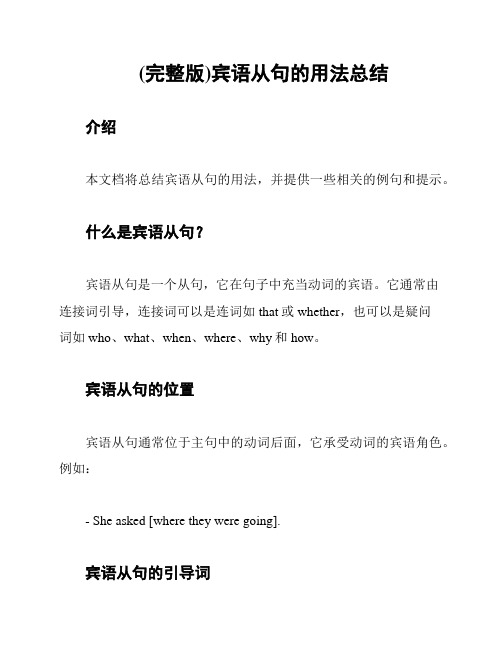
(完整版)宾语从句的用法总结介绍本文档将总结宾语从句的用法,并提供一些相关的例句和提示。
什么是宾语从句?宾语从句是一个从句,它在句子中充当动词的宾语。
它通常由连接词引导,连接词可以是连词如that或whether,也可以是疑问词如who、what、when、where、why和how。
宾语从句的位置宾语从句通常位于主句中的动词后面,它承受动词的宾语角色。
例如:- She asked [where they were going].宾语从句的引导词宾语从句的引导词根据不同情况有所不同:1. 连词that:用于陈述句和常见的动词后。
例如:I think [thathe is right].3. 疑问代词:用于特殊疑问句中。
例如:She asked [what hewas doing].宾语从句的语序宾语从句的语序通常和陈述句一样,即主语+谓语+宾语。
例如:- He said [that he loves her].- We don't know [if it will rain tomorrow].宾语从句的虚拟语气用法宾语从句有时也可以使用虚拟语气来表达假设、愿望或建议。
例如:- I suggest [that she study harder].- It's important [that he be on time].注意事项使用宾语从句时,需要注意以下几个问题:1. 引导词的选择:根据主句和宾语从句的语义要求选择适当的引导词。
2. 语序的正确:在宾语从句中,需要保持合适的语序,不要因直接翻译而导致语序错误。
3. 虚拟语气的使用:当需要表示假设、愿望或建议时,可以考虑使用宾语从句的虚拟语气形式。
总结宾语从句在英语中的用法相对灵活,可以用于陈述句、选择疑问句和特殊疑问句中。
在使用宾语从句时,需要选择适当的引导词,保持正确的语序,并在需要时考虑使用虚拟语气形式。
希望本文对你理解和运用宾语从句有所帮助!参考资料。
英语中宾语从句用法及例句总结(完整)

宾语从句用法及其例句宾语从句用法时态:1.主句用一般现在时,从句可用任意时态。
2.主句用过去时,从句用过去某个时态。
3.主句用过去时,从句是客观真理时,只用一般现在时。
一、宾语从句的连接词从属连词连接宾语从句的从属连词主要有that,if,whether.that引导表示陈述句的宾语从句,if和whether引导表示“是否”的一般疑问句的宾语从句.He told me (that he would) go to the college the next year他告诉我他明年上大学.I don’t know if there will be a bus any more.我不知道是否还会有公交车.Nobody knew whether he could pass the exam.没人知道他是否会通过考试.连接代词连接代词主要有who, whom ,whose ,what ,whoever ,whomever ,wh osever, whatever, whichever等.连接代词一般指疑问,但what, whatever除了指疑问外,也可以指陈述.Do you know who has won Red Alert game?你知道是谁赢得了红色警报的游戏?The book will show you what the best CEOs should know.这本书会告诉你最好的执行总裁该了解些什么.Have you determined whichever you should buy,a Motorola or Noki a cell phone?你决定好是买诺基亚还是摩托罗拉的电话了吗?连接副词连接副词主要有when,where,why,how,whenever,wherever,however 等.He didn’t tell me when we should meet again.他没有告诉我什么时候我们能再见面.Could you please tell me how you use the new panel?你能告诉我怎么用这个新的操作盘吗?None of us knows where these new parts can be bought.没有人知道这些的新的零件能在哪里买到.二、动词的宾语从句大多数动词都可以带宾语从句We all expect that they will win , for members of their team are stro nger.我们都预料他们会赢,因为他们的队员更强壮.He told us that they would help us through the whole work.他告诉我们在整个工作中,他们都会帮忙的.部分“动词+副词”结构也可以带宾语从句I have found out that all the tickets for the concert have been sold out.我发现这场音乐会的所有票都卖光了.Can you work out how much we will spend during the trip?你能计算出这次旅行我们将花费多少钱吗?动词短语也可以带宾语从句常见的这些词有:make sure确保make up one’s mind下决心 keep in mind牢记Make sure that there are no mistakes in your papers before you tur n them in.在上交试卷前确保没有任何错误.可运用形式宾语it代替的宾语从句①动词find,feel,consider,make,believe等后面有宾语补足语的时候,则需要用it做形式宾语而将that宾语从句后置.I think it necessary that we take plenty of hot water every day .我认为每天多喝开水是有必要的.I feel it a pity that I haven’t been to the get-together.我没去聚会,感觉非常遗憾.I have made it a rule that I keep diaries.我每天写日记成了习惯.We all find it important that we (should) make a quick decision abo ut this mater.我们都认为对这件事马上做出决定很重要.②有些动词带宾语从句时需要在宾语与从句前加it这类动词主要有:hate, take , owe, have, see to.I hate it when they with their mouths full of food.我讨厌他们满嘴食物时说话.He will have it that our plan is really practical.他会认为我们的计划确实可行.We take it that you will agree with us.我们认为你会同意我们的.When you start the engine, you must see to it that car is in neutral.开启发动机时, 一定要使汽车的离合器处于空挡位置.③若宾语从句是wh-类,则不可用it代替We all consider what you said to be unbelievable.我们都认为你所说的是不可信的.We discovered what we had learned to be valuable.我们发现我们所学到的东西都是有用的.三、介词的宾语从句用wh-类的介词宾语从句We are talking about whether we admit students into our club.我们正在讨论是否让学生加入我们的俱乐部.The new book is about how Shenzhou 6 manned spaceship was se nt up into space.这本新书是关于神州6号载人航天飞船是如何升入太空的.用that,if引导的介词宾语从句有时候except,but,besides三个介词后可见到that引导的宾语从句I know nothing about my new neighbor except that he used to work with a company.对于我的新邻居我只知道他曾在一家公司上班,其他一无所知.四、形容词的宾语从句常用来引导宾语从句的形容词有: sure,certain,glad,please,happy,sor ry,afraid,satisfied,surprisedI am sure I will pass the exam.我确信我会通过考试.I am sorry that I have troubled you so long.很抱歉我这么长时间在打扰你.He is glad that Li Ming went to see him when he was ill.他很高兴在他生病的时候李明能去看望他.五、if,whether在宾语从句中的区别① if和whether在作“是否”解时,引导宾语从句常放在动词know,ask,c are,wonder,find out等之后,介词后一般不用if②少数动词,如:leave,put,discuss,doubt后的宾语从句常用whether.③ whether后可以加or not,但是if不可以.④在不定式前只能用whether.(如:I can’t decide whether to stay. 我不能决定是否留下。
宾语从句的用法与特点
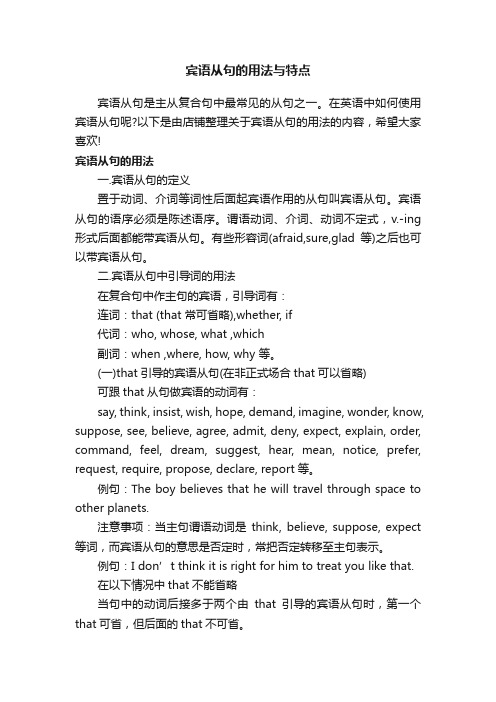
宾语从句的用法与特点宾语从句是主从复合句中最常见的从句之一。
在英语中如何使用宾语从句呢?以下是由店铺整理关于宾语从句的用法的内容,希望大家喜欢!宾语从句的用法一.宾语从句的定义置于动词、介词等词性后面起宾语作用的从句叫宾语从句。
宾语从句的语序必须是陈述语序。
谓语动词、介词、动词不定式,v.-ing 形式后面都能带宾语从句。
有些形容词(afraid,sure,glad等)之后也可以带宾语从句。
二.宾语从句中引导词的用法在复合句中作主句的宾语,引导词有:连词:that (that 常可省略),whether, if代词:who, whose, what ,which副词:when ,where, how, why 等。
(一)that引导的宾语从句(在非正式场合that可以省略)可跟that从句做宾语的动词有:say, think, insist, wish, hope, demand, imagine, wonder, know, suppose, see, believe, agree, admit, deny, expect, explain, order, command, feel, dream, suggest, hear, mean, notice, prefer, request, require, propose, declare, report等。
例句:The boy believes that he will travel through space to other planets.注意事项:当主句谓语动词是think, believe, suppose, expect 等词,而宾语从句的意思是否定时,常把否定转移至主句表示。
例句:I don’t think it is right for him to treat you like that.在以下情况中that不能省略当句中的动词后接多于两个由that引导的宾语从句时,第一个that可省,但后面的that不可省。
宾语从句的用法归纳总结

宾语从句的用法归纳总结宾语从句是英语中一种常见的从句类型,用于作为及物动词或介词后面的宾语,承担特定的语法功能。
在这篇文章中,我们将对宾语从句的用法进行归纳总结。
一、引导宾语从句的连词1. 连接代词:关系代词和疑问代词。
关系代词包括:that, who, whom, whose, which疑问代词包括:what, where, when, why, how2. 连接副词:关系副词和疑问副词。
关系副词包括:where, when, why疑问副词包括:how, how much/many二、宾语从句的位置和结构在主要使用谓语动词、感知动词(see, hear等)、想象类动词(think, believe 等)、请求类动词(ask, request等)以及使役动作(make, let等)后面形成一个完整的陈述句或疑问句。
而主要使用介词后面形成一个名字子句。
1. 完整陈述句结构:主谓(感知/想象/请求/使役)+ 由引导连词引导的宾语从句例如:- I believe that he is telling the truth.(简单句)- Can you tell me where she lives?(复合句)2. 名字子句结构:介词 + 引导连词 + 宾语从句例如:- I am interested in knowing what happened yesterday.(简单句)- She is waiting for him to decide which movie they should watch.(复合句)三、主要用法1. 陈述性宾语从句:用于对事实、真理等进行陈述。
例如:I know that he is a reliable person.2. 疑问性宾语从句:用于提问,要求对事实或真相进行回答。
例如:Do you know what time it is?3. 意愿性宾语从句:表达希望、意愿或建议。
英语宾语从句用法及其例句
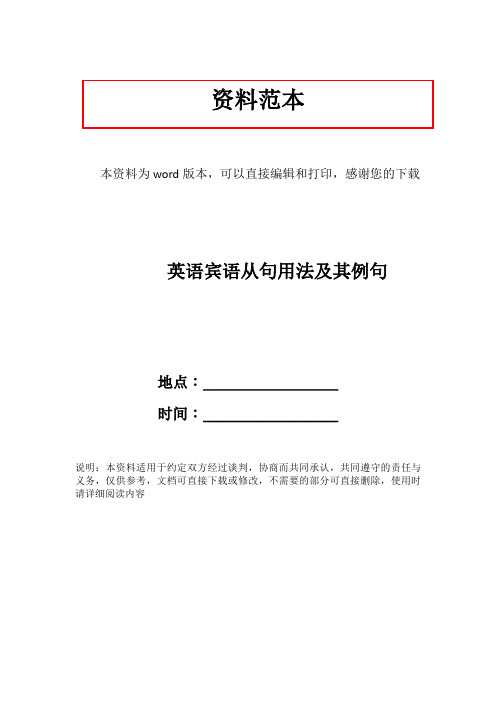
资料范本本资料为word版本,可以直接编辑和打印,感谢您的下载英语宾语从句用法及其例句地点:__________________时间:__________________说明:本资料适用于约定双方经过谈判,协商而共同承认,共同遵守的责任与义务,仅供参考,文档可直接下载或修改,不需要的部分可直接删除,使用时请详细阅读内容英语宾语从句用法及其例句一、宾语从句用法时态:1.主句用一般现在时,从句可用任意时态。
可归纳为“主现从不限”2.主句用过去时,从句用过去某个时态。
可归纳为“主过从四过”3.主句用过去时,从句是客观真理时,只用一般现在时。
4.情态动词could/would用于,“请求”,表示委婉、客气的语气时,从句不受主句的约束。
(一)、宾语从句的连接词从属连词连接宾语从句的从属连词主要有that,if,whether.that引导表示陈述句的宾语从句,if和whether,whether...or not引导表示“是否”的一般疑问句的宾语从句.He told me (that )he would go to college the next year他告诉我他明年上 HYPERLINK"/view/4410.htm" \t "_blank" 大学 .I don’t know if there will be a bus any more.我不知道是否还会有公交车.Nobody knew whether he could pass the exam.没有人知道他是否会通过 HYPERLINK"/view/1493.htm" \t "_blank" 考试 .(二) HYPERLINK "/view/2663660.htm" \t "_blank" 连接代词连接代词主要有who,whom ,whose ,what ,whoever ,whomever ,whosever, whatever, whichever 等.连接代词一般指疑问,但what, whatever除了指疑问外,也可以指陈述.Do you know who has won Red Alert game?你知道是谁赢得了红色警戒的游戏么?The book will show you what the best CEOs should know.这本书会告诉你最好的执行总裁该了解什么.Have you determined whichever you should buy,a Motorola or Nokia cell phone?你决定好是买 HYPERLINK "/view/1724.htm" \t "_blank" 诺基亚还是 HYPERLINK"/view/7274.htm" \t "_blank" 摩托罗拉的电话了吗?(三) HYPERLINK "/view/723555.htm" \t "_blank" 连接副词连接副词主要有when,where,why,how,whenever,wherever,however等.He didn’t tell me when we should meet again.他没有告诉我什么时候我们能再见面.Could you please tell me how you use the new panel?你能告诉我怎么用这个新的操作盘吗?None of us knows where these new parts can be bought.没有人知道这些的新的零件能在哪里买到.二、动词的宾语从句大多数动词都可以带宾语从句We all expect (that )they will win , for members of their team are stronger.我们都预料他们会赢,因为他们的队员更强壮.He told us (that) they would help us through the whole work.他告诉我们在整个工作中,他们都会帮忙的.部分“动词+副词”结构也可以带宾语从句I have found out (that) all the tickets for the concert have been sold out.我发现这场音乐会的所有票都卖光了.Can you work out (that)how much we will spend during the trip?你能计算出这次旅行我们将花费多少钱吗?动词短语也可以带宾语从句常见的这些词有:make sure确保 mak e up one’s mind下决心 keep in mind牢记Make sure that there are no mistakes in your papers before you turn them in.当你在上交试卷前确保没有任何错误.可运用形式宾语it代替的宾语从句①动词find,feel,consider,make,believe等后面有宾语补足语的时候,则需要用it做形式宾语而将that宾语从句后置.I think it necessary that we take plenty of hot water every day .我认为每天多喝开水是有必要的.I feel it a pity that I haven’t been to the get-together.我没去聚会,感觉非常遗憾.I have made it a rule that I keep diaries.我每天写日记成了习惯.We all find it important that we (should) make a quick decision about this matter.我们都认为对这件事马上做出决定很重要.②有些动词带宾语从句时需要在宾语与从句前加it这类动词主要有:hate, take , owe, have, see to.I hate it when they say with their mouths full of food.我讨厌他们满嘴食物时说话.He will have it that our plan is really practical.他会认为我们的计划确实可行.We take it that you will agree with us.我们认为你会同意我们的.When you start the engine, you must see to it that car is in neutral.开启发动机时, 一定要使汽车的离合器处于空挡位置.③若宾语从句是wh-类,则不可用it代替We all consider what you said to be unbelievable.我们都认为你所说的是不可信的.We discovered what we had learned to be valuable.我们发现我们所学到的东西都是有价值的. 三、介词的宾语从句:用wh-类的介词宾语从句:We are talking about whether we admit students into our club.我们正在讨论是否让学生加入我们的俱乐部.The new book is about how Shenzhou 6 manned spaceship was sent up into space.这本新书是关于神州6号载人航天飞船是如何升入太空的.用that,if引导的介词宾语从句有时候except,but,besides三个介词后可见到that引导的宾语从句I know nothing about my new neighbor except that he used to work with a company.对于我的新邻居我只知道他曾在一家公司上班,其他一无所知. 四、形容词的宾语从句常用来引导宾语从句的形容词有:sure,certain,glad,please,happy,sorry,afraid,satisfied,surprisedI am sure I will pass the exam.我确信我会通过考试.I am sorry that I have troubled you so long.很抱歉我这么长时间在打扰你.He is glad that Li Ming went to see him when he was ill.他很高兴在他生病的时候李明能去看望他.五、if,whether在宾语从句中的区别① if和whether在作“是否”解时,引导宾语从句常放在动词know,ask,care,wonder,find out等之后,介词后一般不用if② 少数动词,如:leave,put,discuss,doubt后的宾语从句常用whether.③ whether后可以加or not,但是if不可以.④ 在不定式前只能用whether.(如:I can’t decide whether to stay. 我不能决定是否留下。
宾语从句的英语

宾语从句的英语一、宾语从句的定义:宾语从句(OBJECT CLAUSE)是名词性从句的一种。
在主从复合句中充当宾语,位于及物动词、介词或复合谓语之后的从句称为宾语从句。
宾语从句分为三类:动词的宾语从句,介词的宾语从句和形容词的宾语从句。
二.构成:关联词+简单句三.宾语从句的三种基本形式:1.从属连词that引导that无词义,不充当句子成分,可省略。
如:He told me (that) he was ill.他告诉我他生病了。
注意:以下情况that不能省略①主句的谓语动词连接多个宾语从句时,第一个that可以省略,而其他的that不能省略。
如:I think (that) it will be sunny tomorrow and that we will go shopping.我认为明天是晴天,我们将去购物。
②that 引导的宾语从句作介词宾语时,that不能省略。
如:I know nothing about her except that she is a teacher.我对她一无所知,只知道她是个老师。
③that引导的宾语从句和主句的谓语动词之间有插入语时,that不能省略。
如:I remembered, first of all, that I lost my USB.我记起来了,尤其重要的是,我弄丢了优盘。
④that 从句位于句首时,that不可省略。
如:That he ever did such a thing I simply don't believe.我简直不相信他做了这样的事。
⑤当宾语从句的主语是his, that或有his和that修饰时。
2.从属连词if/whether引导一般情况下可以相互替换,在口语中多用if,不充当句子成分,有具体的含义“是否”。
如:I don't know if you can help me.我不知道你能否帮助我。
I doubt whether he will get there on time.我怀疑他能否准时到那儿。
宾语从句who的用法归纳

宾语从句who的用法归纳宾语从句是英语语法中的一种特殊句型,用于作为主句中的宾语。
它可以由多种连接词引导,其中包括who。
本文将对宾语从句中的who的用法进行归纳和讨论。
一、who引导宾语从句表示人1. 主动形式:在复合句中,who引导的宾语从句可以表示一个人作为主动的动作执行者或行为的发出者。
例如:I don't know who is coming to the party tonight.(我不知道今晚谁要来参加聚会。
)2. 被动形式:在被动结构中,who称之为被动关系代词,指向一个人作为被动的执行者或行为接收者。
例如:I wonder who was invited to the conference.(我很好奇,谁被邀请参加了会议。
)二、who引导宾语从句表示事物或情况当who引导宾语从句时,也可用来指代事物或情况,并在句子中充当其他成分。
1. 充当表语:例如:The question is who will be responsible for this project.(问题是谁将对这个项目负责。
)2. 充当介词宾语:例如:This is a book on who invented electricity.(这是一本关于电力发明者的书。
)三、who引导宾语从句表示特定身份或角色在某些情况下,who引导的宾语从句用来指代一个具有特定身份或职责的人。
1. who + to be可以用来指代政治或宗教领袖:例如:Many people wonder who is to be the next president of this country.(许多人想知道谁将成为这个国家的下一任总统。
)2. who + have/has been则用来指代已知事实中的特定人物:例如:I found out who has been stealing my lunch from the office refrigerator.(我找出了是谁一直在偷我办公室冰箱里的午餐。
初中英语中的宾语从句用法详解
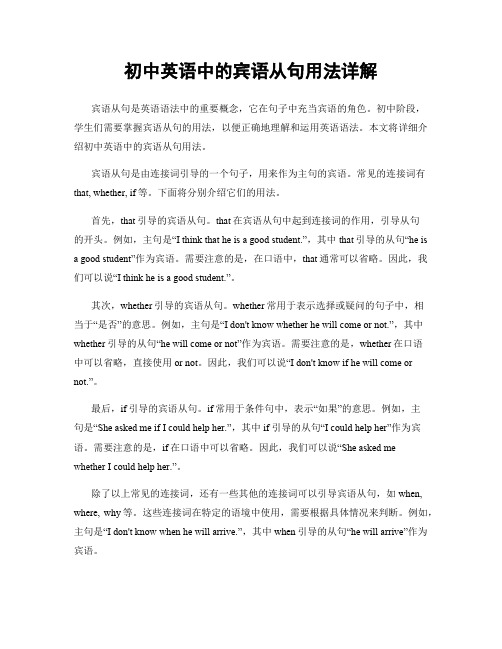
初中英语中的宾语从句用法详解宾语从句是英语语法中的重要概念,它在句子中充当宾语的角色。
初中阶段,学生们需要掌握宾语从句的用法,以便正确地理解和运用英语语法。
本文将详细介绍初中英语中的宾语从句用法。
宾语从句是由连接词引导的一个句子,用来作为主句的宾语。
常见的连接词有that, whether, if等。
下面将分别介绍它们的用法。
首先,that引导的宾语从句。
that在宾语从句中起到连接词的作用,引导从句的开头。
例如,主句是“I think that he is a good student.”,其中that引导的从句“he is a good student”作为宾语。
需要注意的是,在口语中,that通常可以省略。
因此,我们可以说“I think he is a good student.”。
其次,whether引导的宾语从句。
whether常用于表示选择或疑问的句子中,相当于“是否”的意思。
例如,主句是“I don't know whether he will come or not.”,其中whether引导的从句“he will come or not”作为宾语。
需要注意的是,whether在口语中可以省略,直接使用or not。
因此,我们可以说“I don't know if he will come or not.”。
最后,if引导的宾语从句。
if常用于条件句中,表示“如果”的意思。
例如,主句是“She asked me if I could help her.”,其中if引导的从句“I could help her”作为宾语。
需要注意的是,if在口语中可以省略。
因此,我们可以说“She asked me whether I could help her.”。
除了以上常见的连接词,还有一些其他的连接词可以引导宾语从句,如when, where, why等。
这些连接词在特定的语境中使用,需要根据具体情况来判断。
宾语从句用法总结

宾语从句用法总结宾语从句是一个从属的句子,用来作为主句的宾语。
它通常由连词(如that, if, whether, when, where, how, why)引导,后面跟着的是一个完整的句子,具备主语和谓语。
宾语从句在英语语法中占据重要的地位,它可以充当名词的作用,完成丰富多样的功能。
下面是有关宾语从句用法的一个总结,帮助读者更好地理解和运用宾语从句。
一、宾语从句的引导词1. 引导词that: 当宾语从句中表示陈述、说话的内容时,通常使用that作为引导词。
例如:I think (that) she is a good student.我认为她是个好学生。
2. 引导词if/whether: 当宾语从句中表示选择、疑问、或是说话者的意愿时,通常使用if或whether作为引导词。
例如:I don't know if/whether he will come to the party.我不知道他是否会来参加派对。
3. 引导词wh-: 当宾语从句中表示疑问时,通常使用wh-词作为引导词。
根据所问的内容,选择合适的引导词,如what, who, where, when, why, how等。
例如:Do you know what time it is?你知道现在是几点吗?二、宾语从句的语序和时态1. 语序:宾语从句的语序一般为陈述句语序,即主语+谓语。
例如:He asked me if I had finished my homework.他问我是否完成了作业。
2. 时态:宾语从句的时态要根据实际情况选择适当的时态。
一般情况下,主句和从句的时态是一致的,但也可以根据需要使用其他时态。
例如:She told me (that) she will go shopping tomorrow.她告诉我明天她要去购物。
三、宾语从句的更多用法1. 宾语从句作为动词的宾语:宾语从句可以作为及物动词的宾语出现,表示人们说话的内容、看法、意愿等。
宾语从句用法详细讲解

宾语从句用法详细讲解哎,大家好,今天我们聊聊一个看似简单但其实可以让你头疼的语法点——宾语从句!你可能觉得宾语从句很“高级”,好像只能在语文书里才能看到。
其实啊,宾语从句并没有你想的那么复杂,说白了它就是用来做动词的宾语的,咱们平时说话的时候,也会经常用到它!听着是不是很熟悉?“我不知道他在想什么”这句话不就是典型的宾语从句嘛。
先不说这些枯燥的语法术语,咱们直接来看一看宾语从句的样子。
想象一下,某天你正在跟朋友聊八卦,突然他说:“我听说小张又谈恋爱了!”嗯,这里“我听说”就是句子的主句,而“我听说小张又谈恋爱了”这部分就是宾语从句了。
也就是说,你听到的内容是个句子,是不是很简单?不过这就带来一个问题——“小张谈恋爱了”是个完整的句子,所以它在这儿怎么跟主句搭配?你会发现,宾语从句的结构往往会用到一些特殊的连词,比如“what”、“whether”或者“that”。
你会好奇,怎么知道什么时候用“what”,什么时候又该用“that”呢?别着急,慢慢来,咱们一步步捋清楚。
首先说说“what”。
中文里你用“什么”来问问题,英语中就有“what”来代替。
比如说,你想问“他做了什么?”英语就用:“What did he do?” 然后,如果你在说一个句子里有“what”,那么它的功能就是替代你想要问的东西。
这就好比你告诉我:“我不知道他做了什么。
”这时候,英语就需要用到宾语从句:“I don't know what he did.” 啊,看吧,简单吧?不过你可能会觉得“what”这个词用起来有点复杂,别担心,之后会讲得清楚。
再说说“whether”和“if”。
如果你告诉我:“我不知道他是不是生气了。
”英语中就得用“whether”或者“if”来构建宾语从句:“I don't know whether he is angry.” 或者“ I don’t know if he is angry.” 你会发现这两个词其实差不多,意思也是“是否”。
- 1、下载文档前请自行甄别文档内容的完整性,平台不提供额外的编辑、内容补充、找答案等附加服务。
- 2、"仅部分预览"的文档,不可在线预览部分如存在完整性等问题,可反馈申请退款(可完整预览的文档不适用该条件!)。
- 3、如文档侵犯您的权益,请联系客服反馈,我们会尽快为您处理(人工客服工作时间:9:00-18:30)。
关于英语里宾语从句的用法宾语从句,是名词性从句的一种。
在主从复合句中充当宾语,位于及物动词、介词或复合谓语之后的从句称为宾语从句。
同学们有没有掌握呢?如果有不懂的要抓紧哦。
接下来小编在这里给大家带来宾语从句的用法,我们一起来看看吧!宾语从句用法1概念假如一个句子作谓语动词的宾语的话,我们把这个宾语叫做宾语从句。
宾语从句的完整结构是“主句+引导词+从句”。
Eg: He said that he visit his teacher last year2引导词通常引导陈述句的引导词是“that”引导一般疑问句的引导词是“if”和“whether”引导特殊疑问句的引导词则是众多的特殊疑问代词或疑问副词, what who when 等。
Eg: He asked me if (whether) I was a teacher.直接引语变成宾语从句直接引语:直接引用别人说的话间接引语:转达别人说的话直接引语变成宾语从句,如果冒号,引号里是陈述句形式,要用“that”引导,同时从句中的人称,时态,指示代词,地点状语等都要发生相应的变化。
3人称的变化:遵循一主二宾三不变"一主"是指在直接引语变间接引语时,如果从句中的主语是第一人称或被第一人称所修饰。
从句中的人称要按照主句中主语的人称变化。
如:She said. "My brother wants to go with me. "→She said her brother wanted to go withher."二宾"是指直接引语变间接引语时,若从句中的主语及宾语是第二人称。
或被第二人称所修饰。
从句中的人称要跟引号外的主句的宾语一致。
如果引号外的主句没有宾语。
也可以用第一人称。
如:He said to Kate. "How is your sister now?"→He asked Kate how her sister was then"三不变"是指直接引语变间接引语时。
如果从句中的主语及宾语是第三人称或被第三人称所修饰,从句中的人称一般不需要变化。
如:Mr Smith said. "Jack is a good worker。
"→Mr Smith said Jack was a good worker4时态变化(从句的时态向前倒一个时态)一般现在时——一般过去时一般过去时——现在完成时现在进行时——过去进行时一般将来时——过去将来时现在完成时——过去完成时过去完成时——过去完成时Eg: She said. "I have lost a pen."→She said she had lost a pen现在完成时——过去完成时She said. "He will go to see his friend".→She said he would go to see his friend一般将来时——过去将来时但要注意在以下几种情况下。
在直接引语变为间接引语时,时态一般不变化。
1.直接引语是客观真理。
(地球围着太阳公转,月亮影响潮汐)"The earth moves around the sun and the moon moves around the earth, the teacher told me.→ The teacher told me the earth moves aroun d the sun and the moon moves around the earth。
2.直接引语是过去进行时,时态不变。
如:Jack said. "John, where were you going when I met you in thestreet?"→Jack asked Johnwhere he was going when he met him in the street。
3.直接引语中有具体的过去某年、某月、某日作状语,变为间接引语时,时态不变。
如:Xiao Wang said. "I was born on April 2l, 1980。
" →Xiao Wang said he was born on April 21,1980。
4.直接引语如果是一般现在时。
表示一种反复出现或习惯性的动作,变间接引语,时态不变。
如:He said, "I get up at six every morning。
" →He said he gets up at six every morning。
5.如果直接引语中的情态动词没有过去时的形式(例:ought to,had better, used to)和已经是过去时的形式时,(例:could, should, would, might)不再变。
如:Peter said. "You had better come here today。
" →Peter said I had better go there that day。
5状语变化直接引语变间接引语,状语变化有其内在规律,时间状语由"现在"改为"原来"(例:now变为then,yesterday变为 the day before,地点状语,尤其表示方向性的,或用指示代词修饰的状语,由"此"改为"彼"(例:this 改为that),如:He said, "These books are mine." →He said those books were histhis——thatthese——thosenow——thentoday——that dayyesterday——the day beforeyesterday morning——the morning beforethe day before yesterday——two days beforetomorrow——the next/follow daytomorrow evening——the next/follow eveningthis week——that weeklast week——the week beforehere——therecome——gobring——take6变句型1.直接引语如果是陈述句,间接引语应改为由that引导的宾语从句。
如:She said, "Our bus willarrive in five minutes."→She said t hat their bus would arrive in five minutes.2.直接引语如果是反意疑问句,选择疑问句或一般疑问句,间接引语应改为由whether或if引导的宾语从句.如:He said, "Can you swim, John?" →He asked John if he could swim."You have finished the homework, haven't you?" my mother asked. →My mother asked me whether I had finished the homework."Do you go to school by bus or by bike?" he asked.→He asked me if I went to school by busor by bike.3.直接引语如果是特殊问句,间接引语应该改为由疑问代词或疑问副词引导的宾语从句(宾语从句必须用陈述句语序)。
She asked me, "When do they have their dinner?"→ She asked me when they had their dinner.Eg: I don't know whom you should depend on.4.直接引语如果是祈使句,间接引语应改为"tell(ask, order, beg 等) sb (not) to do sth."句型。
如:"Don't make any noise," she said to the children. →She told (ordered) the children not tomake any noise. "Bring me a cup of tea, please," she said.→She asked him to bring her a cup of tea.5.直接引语如果是以"Let's"开头的祈使句,变为间接引语时,通常用"suggest "如:He said, "Let's go to the film." →He suggested going to the film.或: He suggested that they should go to see the film.宾语从句的例句一、十句宾语从句例句:I think you are great.我认为你很棒。
I think it necessary that we take plenty of hot water every day .我认为每天多喝开水是有必要的。
I guess he is Jack.我猜他是杰克。
I know there is a supermarket near here.我知道附近有超市。
I wonder if there is a WC near here.我想知道附近有没有厕所I don’t know if there w ill be a bus any more.我不知道还会不会有公家车。
I don’t know whom you should depend on.我不知道你该依靠谁。
The book will show you what the best CEOs know.这本书会告诉你最好的执行总裁该了解些什么。
Could you please tell me how you read the new panel?你能展示给我怎么用这个新的操作盘吗?Do you know who has won this game?你知道谁赢了这一局游戏吗?二、十个定语从句例句:He is the man who gave me money. 他是给我钱的那个人。
